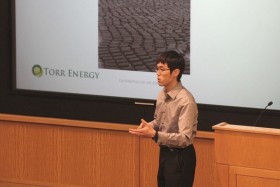This is the first in a series of profiles on the student finalists in SAI’s Seed For Change Competition. On May 6, finalists will pitch their ideas to a judging panel for the chance to with a $40,000 grant to implement their idea in India.
May 6, 3:15PM: Seed For Change Finalists Presentations
Soujanya Ganig, Ed. M Candidate at Harvard Graduate School of Education and SAI Student Coordinator, recently spoke with Kasey Wang, Harvard Law School student, about Torr Energy, a for-profit company that uses a series of technologies and a unique model to produce and sell low-cost waste-derived solid fuel in remote areas.
SAI: Can you tell us how you first developed the idea for Torr Energy?
Kasey Wang: Clean energy is something that I am passionate about. My father had worked on hydroelectric power with China’s Three Gorges Dam and also on solar power in the United States. Later, when I worked in Congress, I saw how the BP Oil Spill of 2010 harmed the people and environment in its vicinity, and I worked on wave energy and other replacement energy initiatives. This concern about energy and the environment encouraged me to apply to an Energy Ventures class, where I met Kevin, and through him, my other teammates Swati and Zach. Kevin had first conceived of the beginnings of Torr Energy when he visited India and saw the immense amount of waste lying around. I look forward to continuing to work with my teammates to harness renewable energy from agricultural waste in India to improve the lives of those who need it the most.
SAI: How has your time at Harvard helped you develop this idea?
KW: I am currently taking a class taught by Professor Gordon Bloom called the Social Entrepreneurship and Innovation Laboratory (HMP 251). Through this class, I learned about setting up a sustainable social enterprise designed to improve the world and the lives of people living in it. Professor Bloom, the founder of the Social Entrepreneurship Collaboratory, is an amazing advisor who has challenged my team to think deeper about our business model and ways we can help our target population. This class is held at the Harvard Innovation Lab (i-Lab), which also has a variety of workshops and resources to help aspiring entrepreneurs, which I have found highly useful. I highly encourage everyone to take advantage of these opportunities!
SAI: Tell us a little about your team members.
KW: The core team is comprised of Kevin, Swati, Zach, and me. I am a Harvard Law School Student who is the Director of Projects at the Harvard Law and Entrepreneurship Project. This organization provides free legal services to start ups. Kevin is a PhD student who is developing the torrefaction technology for Torr Energy. Swati is an MBA, and Zach is a consultant at Cartesian. Together, we are all passionate about providing an energy solution for those who need it the most. In addition to the core team, we also have contacts and partners in India who we hope to work together with to deliver this solution to the local population.
SAI: What have been some successes and challenges with this project so far?
KW: The journey of creating a social enterprise is filled with ups and downs. We are happy that we have a small-scale pilot on the ground, which is powered by first generation torrefaction technology. This technology provides energy, income, and support to the local communities to a limited extent. However, in setting up the pilot, we have certainly have had some failures along the way. For example, we had an earlier iteration of the project in which we used landfill waste instead of agricultural waste, and this caused logistics problems, including issues finding partners and a sustainable, efficient fuel supply. These experiences proved to be great learning opportunities to improve when we launch our second generation project.
SAI: How would winning the Seed For Change Competition help further your project?
KW: We would love to set up a scalable pilot using a community-based model in India. First, this pilot would use agricultural residue from farmers, providing them with a source of income. Second, this pilot would be larger and scalable, as a model for future community-based projects. Third, we would partner with community organizations to support the people living in the towns and villages we hope to benefit. Ideally, we would help 1-3 local non-profits set up energy-production operations in their communities, and then use this pilot and its results to set up and scale similar operations across India. We would be extremely grateful to the Harvard South Asia Institute and the Seed for Change Competition for making this all possible!

